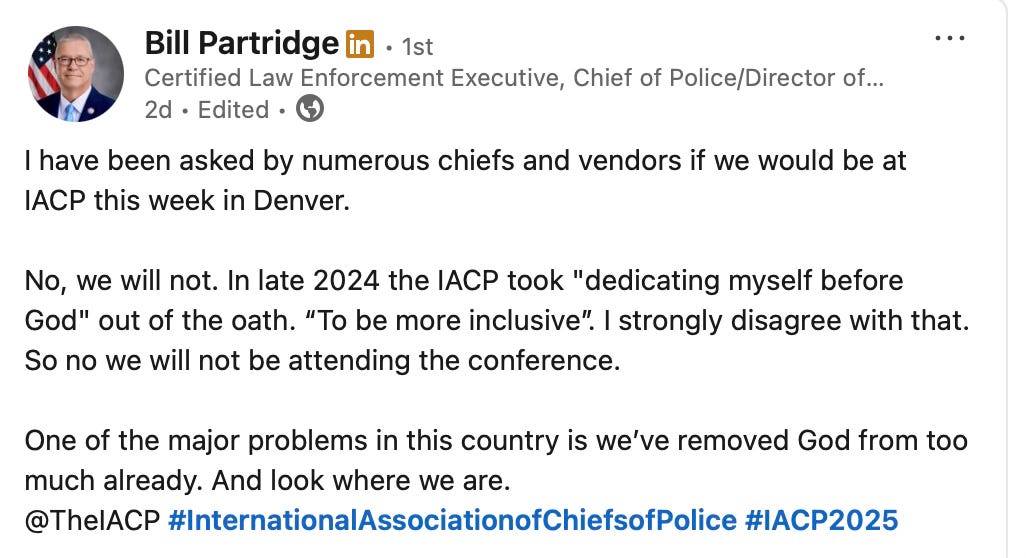The 'Last Resort' Policy Could Be Your Last Day
Crime Is Going Down and Officer Assaults Are Going Up
In the last few articles, I’ve discussed the inherent dangers that law enforcement leaders are placing on officers through their policy decisions.
South Bend, Indiana, was one of the most egrigious. After changing their use of force policy from the constitutional standards to a “last resort” policy, officer injuries increased 64% and use of force increased 60%.
You may wonder how that could be, considering a use-of-force policy that says deadly force can only be used as a “last resort.” The answer is simple. No one knows what that actually means, so the default of the officers making the split-second decisions is not to make a decision.
This hesitation not only gives violent criminals the time to assault officers but also places the officers in a position where they have no choice but to use deadly force rather than a lower level of force, much earlier in the encounter.
This isn’t just my opinion, the FBI has been saying this for years in their research.
Further Evidence
I know what you are thinking. South Bend, Indiana, isn’t exactly a definitive study so I decided to take a larger look at the issue. Frankly, I was hoping South Bend was an anomaly because I have much better things to do.
Unfortunately, I found more of the same.
Many agency leaders have placed their officers in a higher risk of danger with their silly policy changes that have nothing to do with the case law or sound safety practices, but for ease, let’s look at the states that really lost their minds after George Floyd did not die in their jurisdiction.
New Jersey, Maryland, Vermont, Washington, Wisconsin, and Virginia all passed extreme “last resort” policies in 2020 and 2021. Each of them is at a confusion level all of their own, from language that says “absolutely last resort” to “all other options must be exhausted,” but all of them have the “last resort” verbiage in their policies.
Granted, about a dozen other states have similar policies, but for now, we will look at the six states that have ensured their officers are in more danger today than ever before. Out of the six states, just three collected officer assault rates.
Every state had an increase in officers being assaulted.
Virginia increased 123%
Washington increased 42%
Maryland Increased 12%
The Data
Your are probably thinking, that’s not much of a study and you would be correct. The data is not easy to locate, and it won’t shock anyone that our major police organizations do very little to gather it and discuss it. After all, they wouldn’t want anything to get in the way of any stupid policy changes they have made. But after a few hours of parsing several Excel documents, what was anecdotal is getting closer to being factual.
Here is what we do know:
“quick and decisive action is typically taught to be the safest approach for officers faced with dangerous or unpredictable circumstances…researchers have not been able to address these concerns adequately because, similar to most other police training curricula, de-escalation training has not been subjected to rigorous scientific testing” (Engel et al., 2020).
Officer assaults have increased every year since 2020, reaching an all-time high in 2024.
The IACP is meeting this week and I wonder whether they will address the rise in officer assaults?
Officer assaults have risen 53% since the IACP pushed out their model policy changes. At the same time time, we have seen a decrease in violent crime with fewer officers working the streets.
This does not make sense.
Why isn’t anyone discussing it?
More To Come
I don’t expect anyone to do anything about this. To cops working right now, they have become accustomed to dealing with cowards behind a desk or that hold office, but I can’t ignore it. I have a series of open record requests out, and I will report the data when I get it.
It’s also painfully obvious that training must change to compensate for what has been done to the profession.
While there remains no body of scientific evidence to support the policy changes of the last decade, there is a ton of research on what keeps cop safe.
It’s time for a training protocol that does just that.
Dr. Travis Yates retired as a commander with a large municipal police department after 30 years of service. He is the author of “The Courageous Police Leader: A Survival Guide for Combating Cowards, Chaos & Lies.” His risk management and leadership seminars have been taught to thousands of professionals across the world. He is a graduate of the FBI National Academy with a Doctorate Degree in Strategic Leadership and the CEO of the Courageous Police Leadership Alliance.





Great message. You can either train to win or you can train to lose but you can't do both.